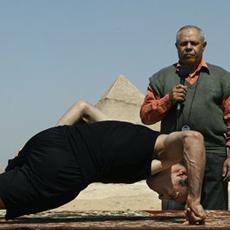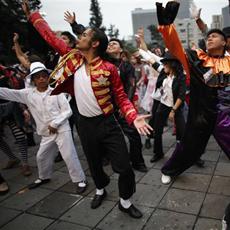
CHRISTOPHER CRUISE: Welcome to THIS IS AMERICA in VOA Special English. I'm Christopher Cruise.
BARBARA KLEIN: And I'm Barbara Klein. This week on our program, we talk about getting into Guinness. We hear from a man who got into the famous record book twice -- and wrote his own book about how he did it. And we hear from another man who holds the record for holding the most records.
(MUSIC)
CHRISTOPHER CRUISE: The Guinness Book of Records was first published in August of 1955 in Britain. The idea came from Sir Hugh Beaver, then managing director of Guinness Brewery. He could not find the answer to what seemed like a simple question: What was Europe's fastest game bird? He thought other people might like a book that could answer such questions and settle arguments.
Today the name is just Guinness World Records. The main offices are in London but the book is now owned by a big Canadian company. The Jim Pattison Group also owns the Ripley's Believe It or Not museums.
BARBARA KLEIN: The Guinness book is one of the most widely read books ever published. More than 100 million copies have been sold in almost 40 languages. A new edition is published every year.

There are records in areas like most tattoos, most piercings, most married, longest hair, fastest talker and biggest hands. Some records appear in almost every edition of the book, like the tallest and shortest people and the oldest man and woman in the world. But as much as 80 percent of the content is new each year.
(MUSIC)
CHRISTOPHER CRUISE: Why do people try to get into the Guinness book? That might seem like asking why Olympic athletes keep trying to run faster, throw farther and jump higher.
Guinness says a world record is not simply a fact but a way to measure ourselves. Knowing "the biggest, the smallest, the fastest, the most and the least," it says, helps us understand our position in the world and how we fit in.
BARBARA KLEIN: Larry Olmsted once held two Guinness records. He set one by playing poker for 72 hours, which was a record for that card game. He set the other for "Greatest Distance Between Two Rounds of Golf on the Same Day." He played golf in Australia and California -- a distance of more than 12,000 kilometers.
Both records have since been broken, and Larry Olmsted says he has no plans to try to recapture them. Instead, he has written a book called "Getting Into Guinness: One Man's Longest, Fastest, Highest Journey Inside the World's Most Famous Record Book."
He tells us that in writing the book he discovered the simple reason why many people want to set a world record.

LARRY OLMSTED: "Everyone wants to be famous. And, in a sense, while I don't think you really become famous, from the record-setter's perception it's a way to be immortalized."
CHRISTOPHER CRUISE: That desire to live forever in a record book may not seem very surprising. But Larry Olmsted says he was surprised to learn that very few records are published in the annual edition of the book.
LARRY OLMSTED: "They don't put most of the records in the book, and that really turns out to be the biggest surprise of all for people who actually set the records. Because almost everybody sets the record with the expectation that they'll see their name in the book, and the majority don't, and they are very, very disappointed."
(MUSIC)
BARBARA KLEIN: There are 30,000 Guinness record categories, including some that are no longer active. The company publishes about 4,000 records a year in the book and posts just 3,000 records online.
Larry Olmsted says everyone who hears he has set world records wants to know how they can set a record. The easiest way to get into the Guinness book, he says, is to be a top athlete who is the best in the world at a sport. Good luck.
CHRISTOPHER CRUISE: For those interested, the Guinness World Records website has a section called Set a Record. It says a record should be "provable, quantifiable and breakable."
Guinness says it hears from tens of thousands of people each year who want to set a record. Guinness officials may take more than a month to decide if they will accept a record-breaking attempt. They reject about 80 percent of the applications.
If they accept a proposal, they send detailed instructions about how to confirm that a record has been set. In some cases, someone from Guinness may come to the record-setting attempt. If not, there should be at least two witnesses who are not friends along with a written record of the activity.
The attempt should be made in a public place. Photographs and media reports will help prove to Guinness that a record was set.

There is a long list of records that Guinness will not accept. For instance, they do not recognize perfect school attendance. Nor do they recognize any activity that could harm people or animals.
(MUSIC)
BARBARA KLEIN: Over the years, the Guinness book has had a number of competitors. Larry Olmsted, author of "Getting Into Guinness," found that most have not survived.
But around the world, he says, there is a subculture of people who spend a great deal of time trying to set or break records. He believes that, at any given time, each record has a few hundred people either thinking about or actively trying to break it.
We asked him what record he would most like to hold.
LARRY OLMSTED: "Uh, richest man in the world [laughs]."
CHRISTOPHER CRUISE: The first chapter of his book is about Ashrita Furman. Mr. Furman has been setting records since 1979. That was when he did 27,000 jumping jack exercises.
Ashrita Furman is 56 years old and a vegetarian who manages a health-food store. He lives near New York City in a small apartment with few possessions.
He has set records on all seven continents. In fact, he holds the record for holding the most Guinness records. He says he sets records so he can deepen his relationship with God.
ASHRITA FURMAN: "This is my way of, you know, trying to transcend my limitations by going deep within, trying to get closer to God through meditation and through prayer and through service. So this is my own, you might say, unusual quest, my own unusual path to get closer to God. The records themselves at this point, really, you know, in and of themselves don't mean anything. At this point it's really just for the challenge of it -- for my own, you might say, personal fulfillment."
BARBARA KLEIN: Ashrita Furman travels around the world setting records. His records include bouncing a ball the fastest for one mile, or 1.6 kilometers, on the Great Wall of China. He has also completed the fastest mile bouncing up and down on a pogo stick in Antarctica.
Mr. Furman has walked 80 miles, or 129 kilometers, with a bottle balanced on his head. And in 1981 he clapped his hands for 50 hours.
In all, he has set or broken more than 340 records. Some of these have been broken by others. But he still holds more than 120 records and sets many new ones every year.
ASHRITA FURMAN: "The last few years it's been around 50 or so. Those 50, many of them are physically challenging and do take sometimes up to, you know, three or four months of training. And some of them are really very simple and involve peeling and eating a lemon in the fastest time or something like that."
CHRISTOPHER CRUISE: Ashrita Furman says he is happy if other people break his records. In fact, he offers advice on his website. He says whatever record you choose to try to break, make sure it is something you love doing and something that gives you joy.
And he offers this advice once you have chosen the record you want to set: Train hard. Plan ahead. Be patient -- don't give up. Expect the unexpected. And learn concentration.
He says meditating has helped him set his records.
ASHRITA FURMAN: "You know, when you're really having a good meditation you feel that you are separate from your body, that whatever is happening to that body is not happening to me -- I'm the soul and I transcend that body. To me it's the most fulfilling thing that I can do. It keeps me in really good shape. It brings me [a] tremendous amount of fulfillment, of closeness to God. And I've had spiritual experiences in the middle of a record. So, I never want to stop."
(MUSIC)
BARBARA KLEIN: I'm Barbara Klein with Christopher Cruise, who wrote this week's program. Our producer was Brianna Blake.
CHRISTOPHER CRUISE: Have you ever thought about trying to set a world record? Have you ever succeeded? We want to hear from you. Share your stories at the VOA Learning English page on Facebook or at voaspecialenglish.com. There, you can find transcripts and MP3s of Special English programs and a section for English learners called The Classroom.
Be sure to join us again next week for THIS IS AMERICA in VOA Special English.
The Loudest Cat? 这只英国猫可能是世界上嗓门最大的
(来源:VOA 编辑:崔旭燕)
